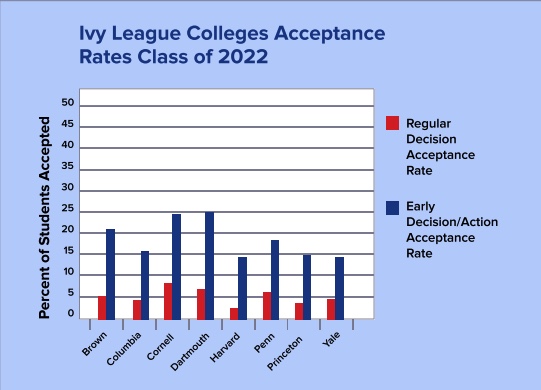
Eden Havel | Head Editor & Newsroom Manager
September 19, 2023
As college season comes around, seniors scramble to finish (or start) their essays, fill out their applications, request letters of recommendation, and decide on their top schools. This season can be trying for students who hope to do well on these applications and stay on top of their school work. Despite the many online resources available to support this process, many struggle to find the tips and tricks necessary to achieve ultimate success. So how do you format your essays? What do you write about? What teachers should you go to for your letters of recommendation? When do you apply? And most importantly: how do you stand out in the pool of thousands of international applicants?
Essays
Top experts in college admissions know a little secret about colleges around the country: every school offers students a hint. The school’s mission statement (UCLA Mission Statement Example) offers students the guidelines to follow when writing their essays. By staying on theme with the core values of the university, your essays can align with exactly what colleges are looking for. The goal of writing your essays is not to explain to the college why you want to go to their institution. The goal is to convince the university why they want you to go to their school. By marketing all of your achievements (activities, leadership, academic experiences, awards and recognition, etc) the most important thing to highlight is how you have spent your time aligning with the mission of the university. Displaying traits of service, volunteer, and community-oriented activities is the best way to quickly embrace the universal emphasis on inclusivity and empathy.
“I am so nervous about my essays,” said senior Kate Johnson. “I will start writing about my activities and leadership stuff, but I don’t know how to format it or how to say it so that it sounds really good. I’m worried that the reason I’ll be rejected is going to be because I didn’t write it all down the right way.”
In each essay (which commonly ranges between 100 to 650 words depending on the school), the key is to format it like an English essay. The first paragraph hooks your reader in, explaining your purpose and providing a thesis statement on the theme of the prompt. The following paragraphs are designed to explain your activities and high school experiences in a way that relates to the thesis statement and convinces the admissions officers further that you are more than your grades.
To stand out in your essays (knowing how many similar essays are read by admissions officers every year), the key tip is this: be yourself. This may sound cliché, but there is nothing more important than authenticity. Answer each question the way you would if you were speaking in person, be confident in what you have to offer, talk about your identity and your family, and use words that enhance your writing to make it more impactful. Words like “empower,” “inspire,” “encourage,” “passion,” “persevere,” and “cultivate” can make your writing beautiful and provide further emphasis on what you are discussing. Remember, your grades only take you past the first level of your evaluation—your essays are what gets you accepted to the college of your choice.
Your essays are an opportunity to emphasize key things that the college has to offer and you intend to participate in these clubs, classes, and communities. Do your research and highlight these things in your essays in a way that is unique and distinct to each college. They are not only curious about the work you’ve done before you graduate, but in how you will continue it afterward.
Essay Rubric
The University of California offers a rubric for writing a successful PIQ (Personal Insight Question) essay. This format can be applied to any college essay, where brevity, specificity, and clarity make all the difference in the world. Graded on a score from 1-5, the person reading the essay is looking for five elements: format, response to the topic, quality of thought, evidence and support, and quality of the writing.
To score all 5s in these categories, the rubric states: “Write no less than [the word count maximum], follow standard paragraph format, address the topic clearly, and respond effectively to all aspects of the task. Demonstrate a thorough critical understanding of the [prompt] in developing an insightful response. Be coherently organized with ideas supported by apt reasons, and well-chosen examples, and have an effective, persuasive, and fluent style.”
Follow these guidelines for any of your essays and hopefully, it will help you to know exactly what they are looking for. It is helpful to ask anyone in your life who has experience in essay writing (parents, siblings, or teachers) to double and triple-check this so that you can have peace of mind that you have done your absolute best.

When to Apply?
Many seniors struggle to determine which deadline they should apply to at each university. There are four deadlines, varying depending on the school: Regular Decision, Early Action, Early Decision, and Restrictive Early Action. What do these all mean? How do they impact your likelihood of acceptance?
- Regular Decision: (early January—mid-February) Many students worry that applying to a school at regular decision will harm their chances of acceptance. However, Northwestern University states, “Applicants in both cycles are very competitive. Last year we enrolled approximately 50% of our incoming freshman class from early decision.” This means that 50% of enrolled applied as regular decision applicants.
- Early Action: (October to mid-November) As long as there are no schools on your list that you plan to apply to with restrictive early action, you can apply early action to as many as you’d like. It may enhance your chances of acceptance as you will be the first of the applicants to be considered.
- Early Decision: (early to mid-November) Like early action, early decision requires you to submit and be considered before everyone in the regular decision pool. However, this decision is binding—you can only apply to ONE SCHOOL with ED, and if accepted, you are required to attend.
- Restrictive Early Action: (early to mid-November) Unlike early decisions, REA is non-binding. However, if you apply to a school with restrictive early action (e.g.: Yale or Stanford), you cannot apply early to any other school. It is considered a “calculated risk.”
(Note: The UC schools open their own separate portal on August 1st with a deadline of November 30th.)
This decision can be stressful for students who are not exactly sure what their top choice school is. But if you are certain, the early decision and restrictive early action pool can better your likelihood of acceptance. Nevertheless, there is no harm in applying early action to a few schools and regular to the rest. The content of your application matters more than the time that you submit it, and colleges know that this is a confusing time for high school students no matter what.
Letters of Recommendation
Most schools require three letters of rec: one from a core class teacher (language, math, science, history), one from an elective teacher, and one from a school or college advisor. It’s important to try to get all three by October so that they have time to be well-written and submitted if required. More important than choosing a teacher whose class relates to your major, it is crucial to select a teacher with whom you have a relationship with who you think will speak highly of you. It is recommended to request this from a teacher from your junior year, to ask in person, and of course, to be communicative and respectful as they write it for you.
On the note of your major, while many students apply undeclared in their application admissions experts recommend declaring a top choice in your application even if you predict it will change a few times afterward. Choosing a major can show them the direction you intend to go in and give them an idea of what your plans are, and again, could set you apart from the 20-50% of undeclared applicants.
Last but Not Least
At the end of the day, the best way to shine is to be prepared. But the looming stress of application season leaves seniors worrying whether they’re making the right decisions, carrying the load of school, sports, and activities, making it challenging to feel prepared enough to excel in this process. Over the next few months, doing research, organizing intentional times to focus on your applications, and even doing last-minute college visits can help aid this stress. The result of organization is a good and clear headspace to create the best application you can create.
“My brother got into UCLA,” said senior Luke Bowman. “He says that a lot of kids get accepted with lots of different grades, ranging from all As to Bs and Cs. There are lots of people who did different programs or clubs or got recognized for different things. He told me it’s important to embrace what you bring to the table and just let yourself stand out—don’t try to be what you think they want just be confident. You’ll get in where you’re meant to go.”
Harvard accepted 4.6% of students in 2022. But despite such low numbers, Harvard states that they reject “thousands of qualified people” every single year out of a pool of likely candidates. If you want to stand out and be a part of that small pool of accepted candidates, the answer is simple: do your absolute best. It’s much better to look back at the challenges we face knowing that we put our best effort forward and put in 110% than always to wonder what more we could have done. At the end of the day, we will all end up where we are meant to be at the end of the year. This season will be short, fast, challenging, and exciting. But guess what! We’ll all be okay. No matter what.

Leave a Reply